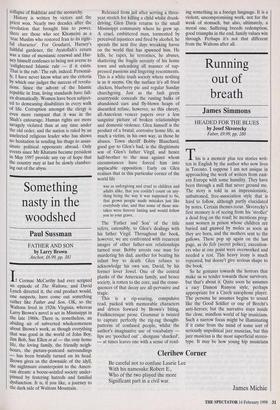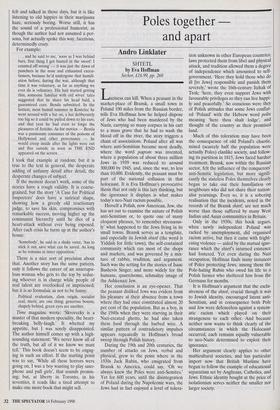Running out of breath
James Simmons
HEADED FOR THE BLUES by Josef Skvorecky Faber, £9.99, pp. 280 This is a memoir plus ten stories writ- ten in English by the author who now lives in Toronto. I suppose I am not unique in approaching the work of writers from east- ern Europe with some humility. They have been through a mill that never ground me. The story is told in an impressionistic, unbuttoned, free-association style that is hard to follow, although partly elucidated by notes. Certain themes recur. Skvorecky's first memory is of seeing from his 'stroller' a dead frog on the road; he mentions preg- nant women in prison whose children are buried and gnawed by moles as soon as they are born, and the mothers sent to the gallows. These pop up again on the last page, as do fizls (secret police), execution- ers who at one point were overworked and needed a rest. This heavy irony is much repeated, but doesn't give serious shape to the book.
So he gestures towards the horrors that make us so tender towards these survivors; but that's about it. Quite soon he assumes a racy Damon Runyon style, perhaps appropriate for a Czech saxophone player. The persona he assumes begins to sound like the Good Soldier or one of Brecht's anti-heroes; but the narrative stays inside the close, mindless world of hip musicians. Such a narrow focus might be illuminating if it came from the mind of some sort of seriously unpolitical jazz musician, but this jazz musician is the most superficial stereo- type. It may be how young hip musicians felt and talked in those days, but it is like listening to old hippies in their marijuana haze, seriously boring. Worse still, it has the sound of a professional humorist, as though the author had not assumed a per- sona, but actually spoke this way, facetious, determinedly crazy.
For example: . . . and he said to me, 'soon as I was behind bars, first thing I got busted in the snoot! I counted off wrong' — it was just the dawn of punchers in the nose and exhausted execu- tioners, because he'd undergone that humili- ation before, during the war, although that time it was voluntary, as far as anything we ever do is voluntary. His hair started getting thin, someone familiar with old wives' tales suggested that he shave his head bald, a guaranteed cure. Benda submitted. In the hottest, most humid summer in Kostelec he went around with a hat on, a hat deliberately too big so it could be pulled down to his ears, and that year he had even to forgo the pleasures of Jericho. As for movies — Benda was a passionate consumer of the poisons of Hollywood and other provenance — he would creep inside after the lights were out and flee outside as soon as THE END appeared on the screen .. .
I took that example at random; but it is true to the text in general, the desperate adding of unfunny detail after detail, the desperate changes of subject.
If the memoir doesn't work, some of the stories have a rough validity. It is coarse- grained, but the story 'A Case for Political Inspectors' does have a satirical shape, showing how a greedy old reactionary judge, to save his skin, compromises with remarkable success, moving higher up the communist hierarchy until he dies of a heart-attack without ever being exposed. After each crisis he turns up at the author's house:
`Somebody', he said in a shaky voice, 'has to stick it out, save what can be saved. As long as he remains in inner opposition.'
There is a nice sort of precision about that. Another story has the same pattern, only it follows the career of an unscrupu- lous woman who gets to the top by seduc- ing whoever is in charge while people of real talent are overlooked or imprisoned; but it is so formulaic as not to be funny:
Political evaluation, class origin, socialist zeal, merit, are one thing; generous bosom, shapely behind, green eyes are another.
Time magazine wrote: `Skvorecky is a master of that modern speciality, the heart- breaking belly-laugh.' It whetted my appetite, but I was sorely disappointed. The author himself comes up with a high- sounding statement: 'We never know all of the truth, but all of it we know we must tell.' This book doesn't seem to be engag- ing in such an effort. If the starting point was to say, 'While all these horrors were going on, I was a boy wanting to play saxo- phone and pull girls', that sounds promis- ing; but, at liberty in Toronto, in his seventies, it reads like a tired attempt to make one more book that might sell.


























































 Previous page
Previous page